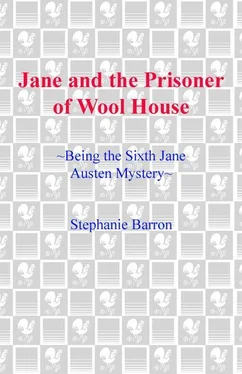Stephanie Barron - Jane and the Prisoner of Wool House
Здесь есть возможность читать онлайн «Stephanie Barron - Jane and the Prisoner of Wool House» весь текст электронной книги совершенно бесплатно (целиком полную версию без сокращений). В некоторых случаях можно слушать аудио, скачать через торрент в формате fb2 и присутствует краткое содержание. Жанр: Исторический детектив, Иронический детектив, на английском языке. Описание произведения, (предисловие) а так же отзывы посетителей доступны на портале библиотеки ЛибКат.
- Название:Jane and the Prisoner of Wool House
- Автор:
- Жанр:
- Год:неизвестен
- ISBN:нет данных
- Рейтинг книги:4 / 5. Голосов: 1
-
Избранное:Добавить в избранное
- Отзывы:
-
Ваша оценка:
- 80
- 1
- 2
- 3
- 4
- 5
Jane and the Prisoner of Wool House: краткое содержание, описание и аннотация
Предлагаем к чтению аннотацию, описание, краткое содержание или предисловие (зависит от того, что написал сам автор книги «Jane and the Prisoner of Wool House»). Если вы не нашли необходимую информацию о книге — напишите в комментариях, мы постараемся отыскать её.
Jane and the Prisoner of Wool House — читать онлайн бесплатно полную книгу (весь текст) целиком
Ниже представлен текст книги, разбитый по страницам. Система сохранения места последней прочитанной страницы, позволяет с удобством читать онлайн бесплатно книгу «Jane and the Prisoner of Wool House», без необходимости каждый раз заново искать на чём Вы остановились. Поставьте закладку, и сможете в любой момент перейти на страницу, на которой закончили чтение.
Интервал:
Закладка:
“She professes a good deal of unhappiness,” I said carefully. “Indeed, she exhibits anger. She told us that she could not meet with you, Captain Seagrave, for fear of the reproaches she might rain upon your head. And yet we find her here this morning …”
“It is the first glimpse of her I have had since that dreadful day in January, when I engaged the Manon” he said heavily. “I bade Chessyre break the news of young Simon's loss when he achieved Southampton, as I could not be first myself; and how Phoebe took it I know not — for I was prevented exchanging so much as a word with my lieutenant, on account of his charges. God!” He struck a blow to his forehead, as though to blot out all that had been, and all that might be. “If only man were capable of knowing all, and ordering his days, so that a world of trouble might be prevented!”
“Then he should be as his Maker, and our world be Heaven upon Earth,” I observed quietly. “Have you loved Mrs. Carruthers long?”
Tom Seagrave stared. “Loved her? Would you fall into the same error as my wife, Miss Austen? Do not be such a fool!”
“But, Tom—” spluttered Frank.
“I esteemed Phoebe Carruthers as the wife of a good friend — a man I regarded almost as a brother; I attempted to improve her situation in what manner I could, when Hugh was killed at Trafalgar. In Simon I cherished the father reborn in the son — and felt as cruel an anguish at the boy's death as I should feel for the loss of my own. But love, for Phoebe?” He shook his head.
I looked at Frank. My brother was gaping.
“Remorse has driven me like a madman,” Seagrave told us. “A thousand times I have consulted my conscience — I have wondered, and blamed myself for failing to place poor Simon in a position of safety. I had not realised the boy was aloft — he should have been with the other Young Gentlemen, carrying powder to the guns. When I saw his body dashed upon the deck, I felt myself a murderer.”
It was as though he had read his wife's thoughts for weeks past, and found no argument to refute them.
“I dreaded the admission of my guilt to Phoebe — she who has borne so much. When I returned to Portsmouth, I learned that she was thrown into deepest mourning. I rode immediately over to Southampton, but she would not receive me. I tried once more, a few days later, and still she would not consent. And so I began to write— letter after useless letter, all of them returned. I begged her forgiveness. I called myself a murderer. I told her that if I could hurl myself into death in Simon's place, I should have done so in a thrice. But she never read my words.” He looked down at his clenched hands. “No one was more surprised than I when she entered my prison this morning.”
Mr. Hill stirred beside me. “And why do you think she came, sir?”
Seagrave glanced up. “She said that the gossip of the naval set would have it that we were lovers. She told me that the suggestion had pained her deeply, as it must affect my wife. Her marriage to Sir Francis, she believes, may put a stop to such outrage.”
I coloured. If Phoebe Carruthers had reason to fear the gossip of Southampton, then I was certainly the cause. I had thrown the implication in her face in East Street, only yesterday.
But surely, I argued, whatever the woman said was lies! We knew that she had acted as Sir Francis's lure. She merely attempted to throw Tom Seagrave off the scent, as she had attempted to persuade ourselves of her disinterested good.
“No reproach did she utter, for Simon's death,” said Seagrave wonderingly. “No mention of the lad was suffered to pass her lips. The lady is remarkable in her self-command.”
“Why did you seek her in Bugle Street on Wednesday night, if you knew that all entreaty — all explanation — must be in vain?” enquired Frank.
Seagrave started as though slapped by a cold sea wave. “I went in search of my wife, Austen. Surely that has always been obvious?”
“Your wife?” I repeated. “What has Mrs. Seagrave to do with Bugle Street?”
“It is she whom I have endeavoured to protect,” Seagrave returned. “On Wednesday she was so unfortunate as to discover in my desk drawer the packet of letters I had written to Phoebe Carruthers — all returned. She suspected the worst of our acquaintance.”
“And so you thought that Louisa was determined to confront Mrs. Carruthers?”
Seagrave hesitated, as though uncertain how much to reveal. “My wife has been exceedingly unwell for some time. Her aunt — a Lady Templeton — has lately attempted to revive her connexion with Louisa, and unsettled her nerves decidedly. Lady Templeton descended upon Portsmouth on the Wednesday morning, and having denied her visit that day, Louisa declared that she would pay her aunt a call after dinner. She walked over to Lady Templeton's inn about six o'clock, and when she had not returned by nine, I was naturally anxious. I sent a servant to enquire after my wife, and learned she had quitted the place — in Lady Templeton's carriage — some two hours earlier.”
“You thought your wife fled to Southampton?”
“I did. I saddled one of the inn's horses and rode over directly to Bugle Street, convinced that Louisa intended a scene before Mrs. Carruthers. I may say that I lathered my mount unforgivably, and arrived at half-past ten.”
“And found no one at home,” I said thoughtfully. “And Mrs. Seagrave?”
“—Was nowhere in the vicinity. I concluded that Louisa had driven out in a wholly different direction, and at that hour was probably returned to our lodgings in Lombard Street, only to find me gone. I rode home again, at a somewhat more measured pace, and achieved my bed at half-past one.”
Frank's expression was wooden. “Was your wife within?”
“Her bedroom door was closed,” said Seagrave abruptly. “I did not like to disturb her. She suffers from nightmare. And as you know, I had reason to guard my sleep as well that night. I was to face court-martial in the morning.”
The Captain's face was hard — as unyielding as any of the Enemy might find it. It occurred to me, as we took our leave, that whatever his failings in duty or attention, Tom Seagrave still meant to shield his wife.
WE HAD TOLD SEAGRAVE NOTHING OF ETIENNE LaForge's escape, nor of our suspicions of Sir Francis Farnham. Whether the shock of Seagrave's disclosures— the surprise of his history with Phoebe Carruthers — or some inner caution proscribed the topic, I shall leave the reader to determine. It was nonetheless true, however, that we quitted the gaol without the necessity of mutual consultation, and that we breasted the High in heavy silence, each of us lost in thought.
“Captain Austen,” said Mr. Hill, “it occurs to me that proper feeling might dictate a call upon Mrs. Seagrave. Would you regard such an act as likely to break the Sabbath — or entirely within the compass of these extraordinary circumstances?”
“I shall bear you company, Hill,” said my brother grimly, “and regard it as a charity. Jane? Are you greatly fatigued? I confess I should welcome the presence of a lady at this interview.”
“I was always a slave to the poor and downtrodden,” I observed piously, and placed my hand within his arm.
Chapter 24
Incitement to Vice
1 March 1807, cont.
MRS. SEAGRAVE LOOKED VERY ILL INDEED AS SHE WAS ushered into the Dolphin's upper parlour. Her hair in its cruelly tight knot was lifeless, her eyes overly bright, and her countenance determinedly sallow. If she had taken anything by way of food in the days since I had last seen her, it had added nothing to her frame.
“Forgive me,” she said without preamble. “I am not attired to receive visitors. I hardly looked for any today.”
Читать дальшеИнтервал:
Закладка:
Похожие книги на «Jane and the Prisoner of Wool House»
Представляем Вашему вниманию похожие книги на «Jane and the Prisoner of Wool House» списком для выбора. Мы отобрали схожую по названию и смыслу литературу в надежде предоставить читателям больше вариантов отыскать новые, интересные, ещё непрочитанные произведения.
Обсуждение, отзывы о книге «Jane and the Prisoner of Wool House» и просто собственные мнения читателей. Оставьте ваши комментарии, напишите, что Вы думаете о произведении, его смысле или главных героях. Укажите что конкретно понравилось, а что нет, и почему Вы так считаете.












